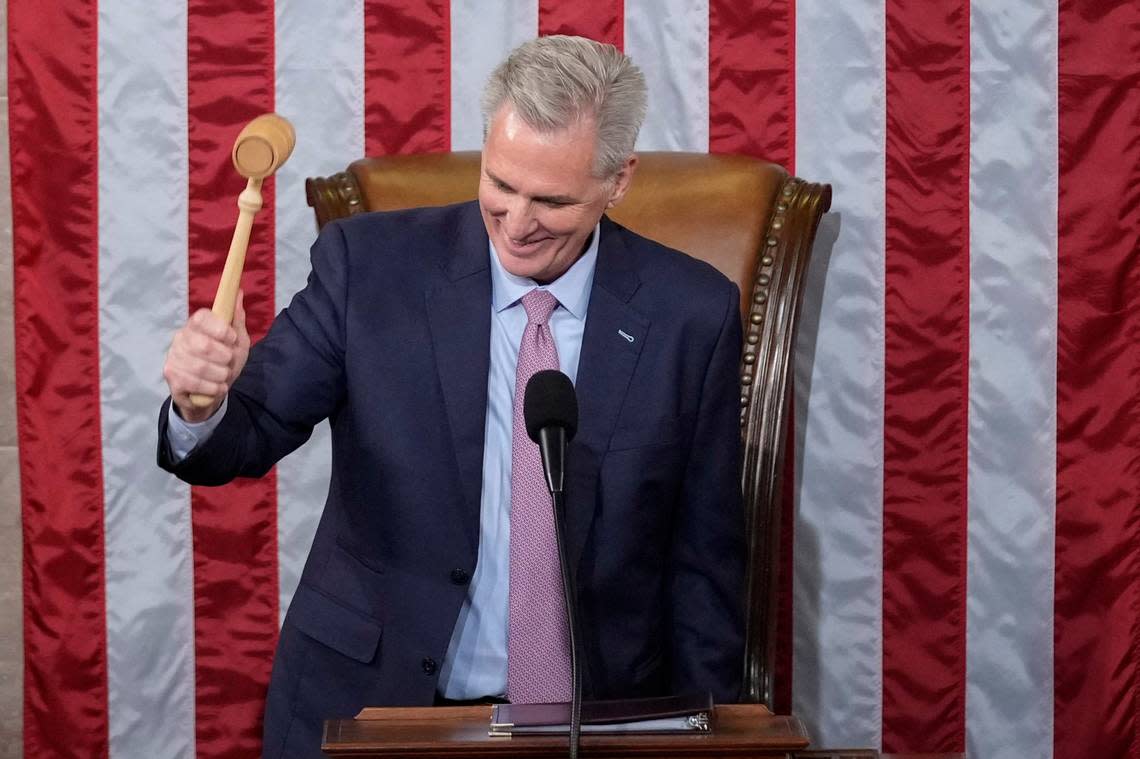Mark Davis: McCarthy speaker battle was messy, but it proves system isn’t beyond hope | Opinion
We all know that deep political divides lie ahead in Washington. As a narrow Republican majority in the House pushes back against a Democratic White House and Senate this year and next, the conflicts will be loud and sometimes bitter. Last week, the battles in the Republican ranks proved that the party’s House majority will not always act in harmony.
But as Friday turned to Saturday under the Capitol dome, the fight to elect a House speaker came to an end, and late-night TV viewers were treated to some moments that suggest the system is not broken beyond hope.
At 1:13 a.m. Eastern time, the chair recognized the man who had held firm under fire from naysayers in his own party. Democratic leader Rep. Hakeem Jeffries of New York declared: “It is now my solemn responsibility to hand over the people’s gavel to a son of Bakersfield, a former small business owner, a proud product of a firefighter’s household — the gentleman from the great state of California and the next speaker of the 118th Congress, Kevin McCarthy.”
With that gracious introduction, Jefferies will now occupy the role McCarthy has held for four years: minority leader. Their tangles will fill the headlines moving forward, but their hug at the House lectern was a moment of basic human decency that can serve to recall a more civil time, when Democrats and Republicans waged ideological warfare without sharp animosity.

“Our debates will be passionate, but never personal,” McCarthy told Jeffries, who in the previous days had won the support of all 212 Democrats in each round of balloting for speaker. But he added a smiling caution: “I warn you, I also won 100 percent of my conference vote on this floor two years ago. So, good luck!”
The difference, of course, was that in 2020, Republicans picked up 14 seats, not enough to win back the majority. As such, they followed a path of relative cooperation as they stared down the hazards of the continued Nancy Pelosi speakership and the new Joe Biden presidency.
But as is often observed, Republicans can seem more coherent on the outside when seeking power than when they actually win it. Denied an expected “red wave” in November’s elections, the GOP embarked on a quest for leadership fueled by the frustration of underperforming.
More than 200 Republicans gladly lined up behind McCarthy, the heir apparent. Twenty said no, and their opposition kept him far from the 218 needed to win the title. As the first vote morphed into the second, third, eighth, 12th and beyond, stark questions arose: Would we ever get a speaker, or would Congress remain immobilized? Would McCarthy have to mortgage his career, stepping down to clear the way for a nominee who could win?
As voices from both parties lamented the paralysis, conservatives could be heard not-so-jokingly cracking that there are worse things than a Congress forced into inactivity.
But in all seriousness, while “The Twenty” constituted a small fraction of the full Republican congressional contingent, their unyielding stance fully prevented McCarthy from claiming that “people’s gavel.” Who would surrender?
Ultimately, no one did. As staunchly conservative Freedom Caucus members called on McCarthy to give up, he made clear he would not. As some opponents signaled willingness to bend if offered substantive concessions in House procedure, he navigated the path that led to his success: He gave them what they wanted, including a more open budgeting process and more influence over legislation coming up for a vote.
The Twenty then gave McCarthy what he needed — in some cases outright yes votes, in others a vote of “present,” which they knew reduced the number needed for the required margin.
In the end, staunch McCarthy skeptics such as Florida Rep. Matt Gaetz and Colorado Rep. Lauren Boebert can say they did not actually vote for him, and McCarthy can say he stood firm and prevailed.
So was this week the embarrassing, harmful spectacle many made it out to be? It seems the only hand-wringing was from Democrats seeking to mock GOP discord and Republicans resenting that McCarthy was denied a rubber stamp.
Conservatives, less than optimistic after the November results, saw determined fighters throw a wrench into the works, ruffling many feathers but ultimately winning concessions that can pave the way for added trust in a speaker urgently needing conservative credibility.
In his acceptance remarks, McCarthy followed his bipartisan graciousness with a clear identification of the battles he intends to wage, hopefully with a united party behind him. “Our very first bill will kill the funding for 87,000 new IRS agents,” he proclaimed to a standing ovation from half the chamber, additionally promising to tackle “wide-open southern borders, America-last energy policies, and woke indoctrination in our schools.”
As those issues arise, Republicans will expect McCarthy to keep those promises. Democrats will oppose virtually everything he and his party attempt. In other words, after a week featuring events of profound rarity, Congress will soon start to look like its old self again.
But ultimately, with the procedural skirmishes of the moment settled, for all of its high tension, the speaker competition is a reminder that the system may sometimes get messy, but it ultimately works.
Mark Davis hosts a morning radio show on 660-AM and at 660amtheanswer.com. Follow him on Twitter: @markdavis.

